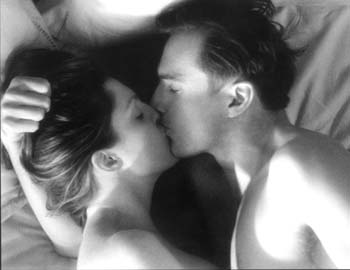![[MetroActive Movies]](/movies/gifs/movies468.gif)
[ Movies Index | Show Times | Santa Cruz Week | MetroActive Central | Archives ]
War and Romance: Ralph Fiennes and Julianne Moore steal away for a tryst in 'The End of the Affair,' adapted from the novel by Graham Greene.
Greene Party
Viewers have to take Neil Jordan's 'The End of the Affair' on faith
By Richard von Busack
IT'S ODD THAT OUR WORD for fidelity in love and our word for belief in God are one and the same. We hope for our lover's "faith," a word that means something so contextually different from the trust in God's love--yet may be as elusive and hard to prove. The End of the Affair explores both varieties of faith. This immaculately made but perplexingly unsatisfying film is adapted from Graham Greene's 1951 novel. In the lead is that paragon of actresses Julianne Moore, who stars as Sarah Miles, a straying-unfaithful wife in England during World War II. Moore's Sarah has concluded an affair with Maurice Bendrix (Ralph Fiennes), a novelist. The author unearths some of Sarah's secrets with the help of a private detective, learning, to his surprise, that the cause of the lady's leaving him was something bigger than both of them, a sudden flare of conscience that transfigured her.
Fiennes and Moore conduct with physical passion this love affair which is described by Greene almost scientifically, like a doctor's description of a fever. Director Neil Jordan heats the affair up to explicitness, but I still can't accept Fiennes as a romantic ideal. If his slightness and peremptory voice are supposed to recall Laurence Olivier, he's yet to learn how to act for the camera, as Olivier learned. One quality that keeps the novel from aridness is that Bendrix enjoys, at least a little, being a scoundrel, a wife-thief. Greene knows about the sweetness of stolen food, and an Olivier, a James Mason, would have known how to show that sweet tooth. But Fiennes, the self-absorbed, the morose, desiccates the story. His rival in love, Stephen Rea, as Henry, Sarah's husband, is brilliant as always, handily overcoming the superlative difficulty of playing a bland, deceived man. Ian Hart is likable as the Dickensian detective hired by Bendrix to snoop on his departed lover. The comic character played by Hart also gives Jordan a chance to show off Bendrix's snobbier side, which is good, because it demonstrates Jordan's own ambiguity about Greene's story, his unwillingness to take what the novel has to say on faith.
But The End of the Affair is really Moore's movie. She is a great actress, with control that looks effortless--so precise yet so spontaneous, so alive with intelligence; composed and yet never artificial; as unselfconscious nude as clothed. Greene's exactingly described story of doomed love is alive when she touches it. And yet I'm not sure how possible Greene's story is to believe. I can't swallow the author's contention that every marriage is made by God, even those juiceless liaisons that beg for a quick death at the divorce court. Nor can I follow his supposition that a man must help decide what's the best place for a woman.
On the one hand, you could argue that The End of the Affair is about the customs of an extraordinary place and time, a story of duty triumphing over desire, as if set among Puritans or Japanese courtiers of 500 years ago. But this death-before-divorce ideal wasn't that common among people of Bendrix's or Sarah's class in the 1940s; the plaguing conscience is a trick of Greene's and how he understood his God. Please understand, I don't think that drama ought to be therapeutic, that the most psychologically comforting thing ought to be done every time. It's just that I didn't have faith in this movie. And Moore, in the film's vacuum, looks like something beautiful trapped in a bell jar.
Copyright © Metro Publishing Inc. Maintained by Boulevards New Media.
![]()

Photograph by David Appleby
The End of the Affair (R; 105 min.), directed and written by Neil Jordan, based on the novel by Graham Greene, photographed by Roger Pratt and starring Ralph Fiennes, Julianne Moore and Stephen Rea, opens Friday at the Nickelodeon.
From the January 26-February 2, 2000 issue of Metro Santa Cruz.